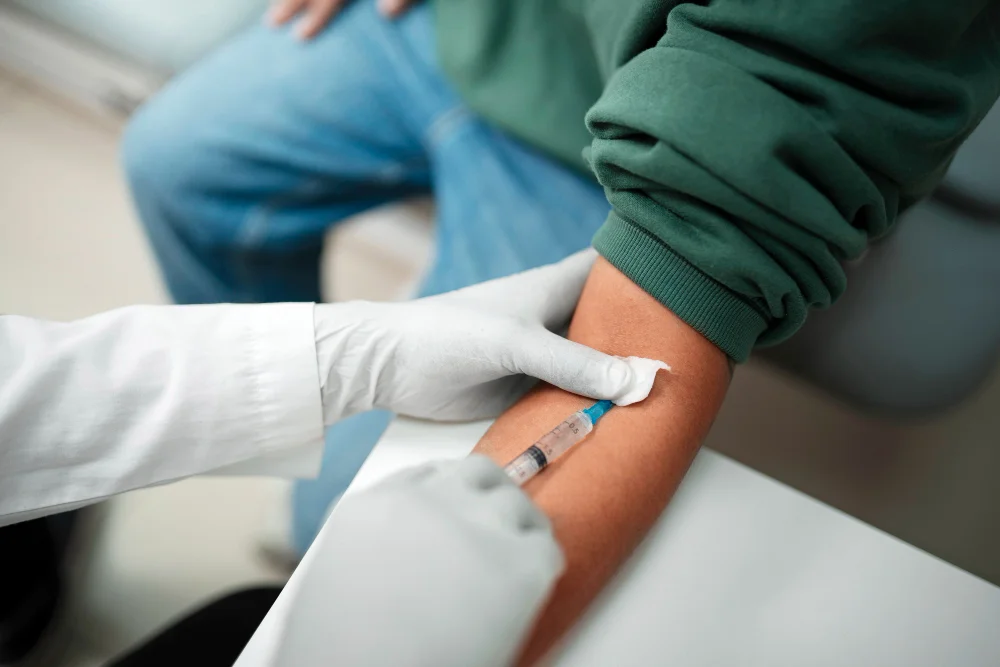“Why is my arm still hurting days after a simple blood test?” If you’ve ever asked yourself this question, you’re not alone.
A few months ago, one of our physiotherapists at Cureoncall, Sana, shared her story of a routine blood test that turned into weeks of tingling and burning down her forearm. She wasn’t being dramatic. She had experienced nerve irritation from the blood draw — something that happens more often than you might think, but rarely gets talked about.
In this guide, we’ll walk you through everything you need to know about nerve pain after a blood draw: why it happens, what symptoms to look out for, and most importantly, what actually helps.
What Causes Nerve Pain After a Blood Draw?
Let’s get this straight: nerve pain from a blood draw is rare, but not unheard of. The main culprit? Accidental needle contact with or injury to a nearby nerve.
Phlebotomy (the process of drawing blood) usually targets veins in the antecubital fossa — that soft bend of your elbow. Just under the skin, however, are small sensory nerves like the medial antebrachial cutaneous nerve or lateral antebrachial cutaneous nerve. If the needle goes too deep or is inserted at the wrong angle, it can nick or irritate one of these nerves.
According to a 2019 study published in The Journal of Clinical Neuromuscular Disease, nerve injuries during venipuncture account for roughly 1 in 25,000 procedures, though experts believe this figure may be underreported due to lack of awareness or misdiagnosis.
Common Symptoms of Nerve Damage from a Blood Draw
Not all post-blood test discomfort is nerve-related. Bruising, mild soreness, and stiffness are common and typically fade within a day or two. However, nerve irritation presents a different set of symptoms:
- Burning or stinging pain near the injection site
- Shooting pain down the forearm or into the fingers
- Numbness or tingling
- Weak grip or muscle weakness
- Pain that worsens at night
If you’re feeling a persistent, electric-type pain that lingers for days or weeks, it’s worth considering nerve involvement.
Immediate Steps to Take if You Suspect Nerve Pain
Dr Amna Qureshi, a consultant neurologist affiliated with Lahore Medical Complex, recommends the following:
“First, don’t panic. Nerve injuries from venipuncture are usually minor and self-limiting. But you need to keep track of symptoms. If there’s progressive pain or weakness, seek professional evaluation.”
Step 1: Stop Aggravating Activities
Avoid heavy lifting, repetitive arm movements, or sleeping on the affected arm.
Step 2: Use Cold or Warm Compresses
Apply a cold compress for the first 48 hours to reduce inflammation. After that, a warm compress may promote healing.
Step 3: Over-the-Counter Pain Relief
Nonsteroidal anti-inflammatory drugs (NSAIDs) like ibuprofen or naproxen can help reduce pain and inflammation. However, consult your GP before prolonged use.
Step 4: Note Your Symptoms
Jot down the intensity, frequency, and triggers of your pain. This will help your physician or physiotherapist assess progress later.
When Should You See a Doctor or Physiotherapist?
You should seek professional care if:
- Pain persists beyond a week
- You feel numbness in fingers or reduced grip strength
- Symptoms are worsening
- Pain disrupts your sleep or daily tasks
At Cureoncall, we often see patients who wait too long before seeking help — usually because they assume the pain will go away. Early intervention means faster recovery.
Treatment Options for Nerve Pain from Blood Draw
1. Physiotherapy
Our in-home therapy team uses a combination of:
- Nerve gliding exercises: These help restore mobility and relieve nerve tension.
- Manual therapy: Gentle mobilisation techniques reduce soft tissue restrictions around the nerve.
- Therapeutic ultrasound: Helps improve circulation and decrease inflammation.
One of our clients, Mr Ali (56), reported a 70% improvement in tingling and pain within 3 weeks of guided physiotherapy sessions after a nerve irritation caused during routine blood work.
2. Neuropathic Medications
Doctors may prescribe medications like:
- Gabapentin or Pregabalin: Common for treating nerve-related pain
- Topical treatments: Capsaicin cream or lidocaine patches can help reduce surface pain
3. Nutritional Support
Vitamin B-complex, especially B1, B6, and B12, plays a crucial role in nerve health. Ask your doctor if supplementation could benefit you.
4. Electrotherapy
In chronic cases, treatments like TENS (Transcutaneous Electrical Nerve Stimulation) may be advised to help modulate pain signals.
How Long Does Nerve Pain Last After a Blood Draw?
In most cases, symptoms start improving within 2 to 4 weeks. Mild nerve irritation typically resolves on its own, especially with physiotherapy and proper care.
However, more serious injuries (e.g. nerve laceration) may require months of rehabilitation and, in rare cases, surgical intervention. According to Neurology India Journal, surgical exploration is only required in less than 1% of nerve injury cases.
Preventing Nerve Damage in Future Blood Draws
While you can’t always control the outcome, you can take proactive steps:
- Request an experienced phlebotomist if you’ve had complications before
- Let them know if you’ve had nerve pain or unusual symptoms after previous blood draws
- Ask if they can use alternative sites like the dorsal hand veins if the antecubital area is risky for you
Cureoncall Tip: Recovery at Home
We’ve helped dozens of clients recover from post-blood draw nerve pain using customised at-home therapy plans. If you’re in Faisalabad, our physiotherapists can visit you, assess the condition in person, and guide you with targeted recovery steps. We believe in empowering patients with both knowledge and hands-on care.
FAQs
Is nerve pain after a blood test dangerous?
Most cases are minor and resolve within weeks. But persistent or worsening symptoms warrant medical attention.
Can nerve pain be permanent?
Rarely. If not treated early, severe cases may result in long-term discomfort or weakness.
Can I still exercise with nerve pain?
Mild movements are encouraged. But avoid any motion that increases pain until assessed by a physiotherapist.
What’s the fastest way to heal?
Early rest, physiotherapy, nutritional support, and avoiding aggravating factors.
Final Thoughts: Your Recovery Matters
Nerve pain after a blood draw may be rare, but that doesn’t make it any less real — or frustrating. The key is recognising the signs early and seeking the right treatment. If you’re in doubt, don’t wait.
Book a consultation with Cureoncall today and let our home physiotherapy team guide your recovery, step by step.
Read Also: How to Treat Green Nails at Home?




